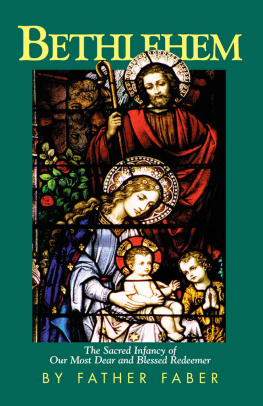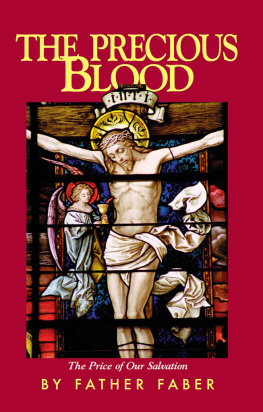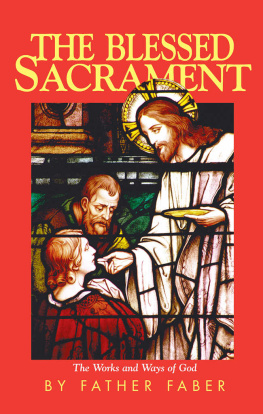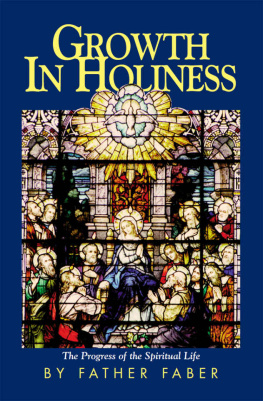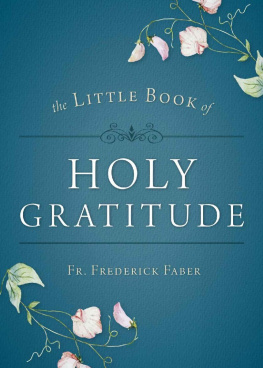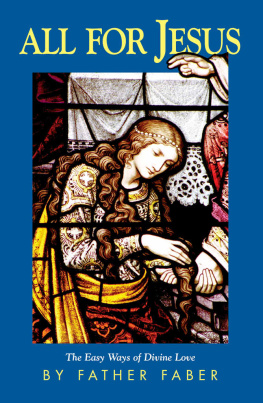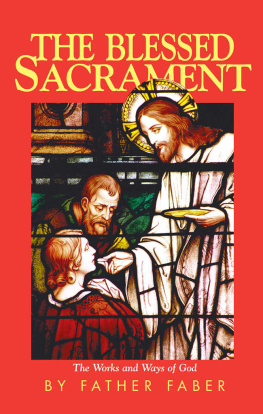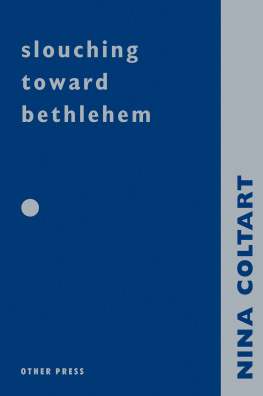Rev. Fr. Frederick Faber - Bethlehem
Here you can read online Rev. Fr. Frederick Faber - Bethlehem full text of the book (entire story) in english for free. Download pdf and epub, get meaning, cover and reviews about this ebook. year: 2015, publisher: TAN Books, genre: Religion. Description of the work, (preface) as well as reviews are available. Best literature library LitArk.com created for fans of good reading and offers a wide selection of genres:
Romance novel
Science fiction
Adventure
Detective
Science
History
Home and family
Prose
Art
Politics
Computer
Non-fiction
Religion
Business
Children
Humor
Choose a favorite category and find really read worthwhile books. Enjoy immersion in the world of imagination, feel the emotions of the characters or learn something new for yourself, make an fascinating discovery.
- Book:Bethlehem
- Author:
- Publisher:TAN Books
- Genre:
- Year:2015
- Rating:4 / 5
- Favourites:Add to favourites
- Your mark:
- 80
- 1
- 2
- 3
- 4
- 5
Bethlehem: summary, description and annotation
We offer to read an annotation, description, summary or preface (depends on what the author of the book "Bethlehem" wrote himself). If you haven't found the necessary information about the book — write in the comments, we will try to find it.
Bethlehem — read online for free the complete book (whole text) full work
Below is the text of the book, divided by pages. System saving the place of the last page read, allows you to conveniently read the book "Bethlehem" online for free, without having to search again every time where you left off. Put a bookmark, and you can go to the page where you finished reading at any time.
Font size:
Interval:
Bookmark:
Bethlehem
Frederick William Faber, D.D.
Nihil | Joseph A. M. Quigley |
Obstat: | Censor Librorum |
| Philadelphi, die 27 Novembris 1955 |
Imprimatur: | + J.F. O'Hara, C.S.C. |
| Archiepiscopus Philadelphiensis | |
| Philadelphi, die 28 Novembris 1955 |
Originally published by the John Murphy Co., Baltimore, Maryland. This edition originally published in 1955 by the Peter Reilly Co., Philadelphia.
Library of Congress Catalog Card Number: 78-66306
TAN Books
Charlotte, North Carolina
www.TANBooks.com
2011
THIS TREATISE
ON
The Sacred Infancy
OF
Our Most Dear and Blessed Redeemer
IS LAID
WITH THE MOST TENDER DEVOTION, THE MOST HUMBLE CONFIDENCE, AND THE MOST REVERENTIAL WORSHIP,
AT THE FEET OF
Saint Joseph ,
THE SPOUSE OF MARY, AND THE GREAT FOSTER-FATHER OF OUR LORD
PREFATORY EPISTLE
TO THE REVEREND
WILLIAM ANTONY HUTCHISON
PRIEST OF THE LONDON ORATORY
My D EAR F ATHER A NTONY:
S IX years ago it seemed natural to me to cast what I had to say in the way of Preface to "Growth in Holiness" into the shape of a Prefatory Epistle to you: so much and so affectionately were you mixed up with the past life and the past experience which that Book represented. It seems still more natural now that I should do the same in the case of "Bethlehem."
For this Book not only represents a past in which you are as much mixed up as with that other past six years ago, but, by God's appointment, it calls up associations which, if they are less joyous, are on that very account more tender. That Will of God, which has laid you aside and given you, apparently for life, only pain and endurance for your portion in the work of his vineyard, has disappointed many hopes and frustrated many schemes, which were more dear to us than strangers can ever understand. Yet I trust that neither of us have, even so much as in thought, rebelled against it.
Your pilgrimage to the East did not, so God willed it! restore the health which you had lost in his service, and which, I have a right to say, was of even more value to me than to yourself. Neither has it pleased him to give you the strength necessary to turn your journey to account in a literary way, for the good of his Church or the illustration of his Word. But much of this Book is yours. To you is owing all that is correct and accurate and pictorial about the scenes which it describes. It gives the Book a sort of sad value to me, to think that it is, with all its incompleteness, the only record of your painstaking visit to the Holy Places.
Moreover, where the imagery bears upon itself so many traces of the lochs of the Clyde, and the mountains of Argyll, it is pleasant to me to remember that the images are common to us both; for, after your long absence, we were first together in the kind and hospitable seclusion of Ardencaple.
The various ways of dividing or regarding the Life of our Blessed Lord have always interested you with a peculiar interest, and have indeed occupied you not a little. You sent me from the Holy Land a scheme of narrating His Life, in connection with the topography of Palestine, Egypt, and the Desert, which I once fondly hoped you would have been allowed to execute. I will now tell you what it is that I proposed to myself in this Book.
There are several ways in which we may treat of the mysteries of the Three-and-Thirty Years of our dearest Lord. We may look at each of them singly, as it is in itself, full of grace and beauty, and distinctively unlike any other. Secondly, we may gather them up into departments, and call them the joyful, the sorrowful, and the glorious mysteries, the three sets differing thus from each other, and, in the unity of each set, each mystery having its own distinctness. Or, thirdly, we may view them as clustering in constellations, and yet these constellations unities, as the Childhood, the Hidden Life, the Public Ministry, the Passion, and the Risen Life or Great Forty Days. Each of these constellations has a more perfect unity than the divisions of mysteries according to their joyous, sorrowful, or glorious character, while at the same time the single mysteries, which compose the unities, have also a greater variety. Fourthly, we have much to learn by putting out of view the separate mysteries, and studying the contrasts and comparisons of those five constellations one with another. It is hard to say whether their analogies or diversities are the most full of theology and devotion.
The following Treatise is a specimen of the third method of considering the Thirty-Three Years, united, where it was naturally suggested, with the fourth. In my own mind, probably from a poetical habit of localizing things, I have become accustomed to know those Five Constellations of Mysteries by the names of Bethlehem, Nazareth, Galilee, Calvary, and Gennesareth, names which will be seen at once to be only approximately true, yet sufficiently so for my purpose.
I must also warn you, and through you my readers, that there are parts of the Treatise liable to be misunderstood without the reading of the whole. In all other respects it will explain itself; and I confide it to your indulgence and theirs, praying our Blessed Lord, if he sees fit, to allow it to quicken and brighten the fires of Christmas in child-like hearts.
I cannot conclude without saying that I feel a kind of unseasonableness and incongruity in publishing a Book just now. The Church is in deep affliction; and devotion to the Church ought to be nowhere a more absorbing passion than in the hearts of St. Philip's sons. The Vicar of Christ is in cruel distress, which is not the less painful to his children because it is far from being without parallel in the annals of the Papacy; and those who own a special obedience to the Saint whom the Church has canonized as the apostle of Rome, cannot have other than bleeding hearts when our holy Father is wearing so manifestly his Crown of Thorns. This Year, blessed be God it is drawing to its close! has had more than its fair share of sorrow, both within and without. It has been a year strewn with losses, as the wrecks strew the angry sea. Nay, even at this hour, both to you and to me, and indeed to our Brothers no less than to ourselves, it is another tender and most sacred association, that I am writing to you from this house, and on this Feast of St. Catherine, the Egyptian martyr, and the dear Saint of Sinai.
Ever, my dear Father Antony,
Most affectionately yours,
F RED. W. F ABER.
ARUNDEL CASTLE,
Feast of S. Catherine,
1860.
CONTENTS
C HAPTER I
THE BOSOM OF THE ETERNAL FATHER
J ESUS C HRIST yesterday, and today, and the same forever! These words of the apostle express at once the noblest and the most delightful occupation of our lives. To think, to speak, to write, perpetually of the grandeurs of Jesus,what joy on earth is like it, when we think of what we owe to him, and of the relation in which we stand to him? Who can weary of it? The subject is continually growing before our eyes. It draws us on. It is a science the fascination of which increases the more deeply we penetrate into its depths. That which is to be our occupation in eternity usurps more and more with sweet encroachments the length and breadth of time. Earth grows into heaven, as we come to live and breathe in the atmosphere of the Incarnation. Jesus makes heaven, wherever he is, whether it be in the tabernacle, or in the heart of the communicant, just as he took the Beatific Vision with him into limbus when he died, and turned the pensive shadows of the patriarchs' home into the full glow of heaven.
But the contemplation of his grandeurs is not merely a joy. It is something beyond an ennobling occupation. It does an actual work in our souls, and a work which the grace of perseverance can make immortal. Rigoleuc has well said, "It is sufficient to look on Jesus, and to contemplate his perfections and his virtues. The very view is of itself capable of producing marvelous effects upon the soul, just as a simple look at the brazen serpent, which Moses reared in the wilderness, was enough to heal the bite of the serpents. For every thing in Jesus is not only saintly, but sanctifying also, and imprints itself on the souls which apply themselves to the consideration of it, if they do so with good dispositions. His humility makes us humble; his purity purifies us; his poverty, his patience, his sweetness, and his other virtues imprint themselves on those who contemplate them. This may take place without our reflecting at all upon ourselves, but simply by our viewing these virtues in Jesus with esteem, admiration, respect, love, and complacency." Let it be with this hope that we now draw nigh to Bethlehem to study the mysteries of his Sacred Infancy. Love labors under the sweet impossibility of ever comprehending the majesty of our dearest Savior. We shall see more at Bethlehem than we can understand; and even what we cannot understand will fill us full of love, and it is love which makes us wise unto salvation.
Next pageFont size:
Interval:
Bookmark:
Similar books «Bethlehem»
Look at similar books to Bethlehem. We have selected literature similar in name and meaning in the hope of providing readers with more options to find new, interesting, not yet read works.
Discussion, reviews of the book Bethlehem and just readers' own opinions. Leave your comments, write what you think about the work, its meaning or the main characters. Specify what exactly you liked and what you didn't like, and why you think so.

